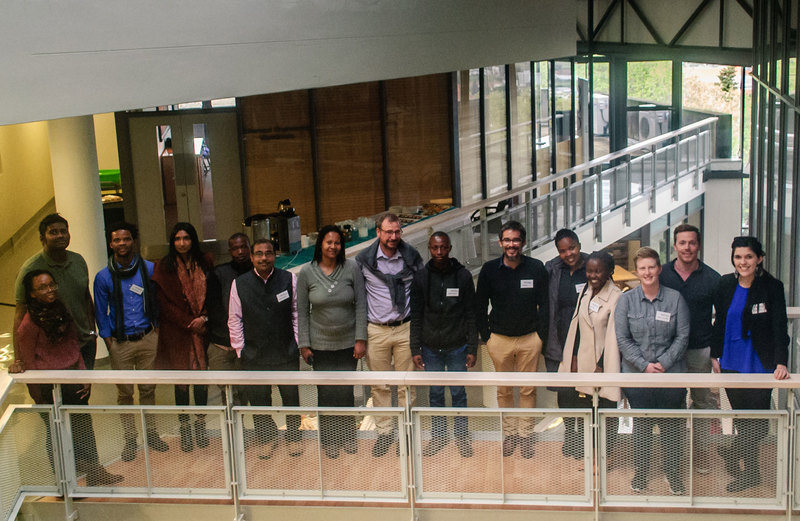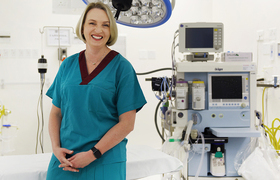Waste-to-fuel project an IChemE Global Awards 2020 finalist
02 October 2020 | Story Adrian Ephraim. Photo Supplied. Read time 6 min.
An intercontinental research team from Brazil, India and South Africa, comprising researchers from the University of Cape Town (UCT), has been announced as an IChemE Global Awards 2020 finalist in the Energy category for their Decentralised Diesel system, which aims to produce fuel from waste.
The IChemE Global Awards celebrate chemical, process and biochemical excellence and are widely considered the world’s most prestigious chemical engineering awards. The waste-to-fuel project team, which spans three continents, hopes to join other winners the likes of the University of Oxford, Imperial College London and Johnson Matthey when a winner is announced in November this year.
UCT’s Professor Eric van Steen, based at the Catalysis Institute and the holder of the South African Research Chairs Initiative (SARChI) Chair in Reaction Engineering, is one member of the scientific group leading the initiative.
“It is of course great to be named a finalist for this IChemE award. We are excited to present our design to this world audience and get greater publicity for this project,” said Professor Van Steen.
The team
The team also includes postgraduates from India and UCT, one of which is PhD candidate Chelsea Tucker, the research coordinator for the project. Tucker’s PhD is focused on developing the overall process design of the project, known as the Decentralised Diesel system.
As a researcher, it is a profound experience to have a project you care so much about spark the interest of a global audience.”
“As a researcher, it is a profound experience to have a project you care so much about spark the interest of a global audience. As a team, we are all incredibly excited for the opportunity to take to the virtual stage with some of the top names in academia and industry,” Tucker said.
“We are hoping that the recognition from IChemE enables us to take this research from a theoretical space into real-world application. This will form the first of many steps in getting the Decentralised Diesel system prototyped and, eventually, implemented across energy-scarce regions of sub-Saharan Africa.”
The other members of the team are Dr Ankur Bordoloi, a senior scientist at the Council of Scientific and Industrial Research (CSIR)-Indian Institute of Petroleum; Dr Dean H Barrett, a joint researcher at the University of the Witwatersrand and the National Center for Research in Energy and Materials in Brazil; and Dr Cristiane Barbieri Rodella, the leader of the XPD Group at the Brazilian Synchrotron Light Laboratory.
The proposed design
The Decentralised Diesel system is based on technology used by Sasol in South Africa to produce fuels from coal and natural gas. Using biogas rather than solid waste allows the system to shift from a technology called waste gasification (which typically costs up to 45% of the entire process) to a process called reforming. Reforming is significantly cheaper and is far more robust, allowing for a high variability in the waste material used.
The design aims to turn waste into diesel and power and could potentially change the face of African cities. Waste is a direct result of rapid urbanisation and economic growth, and is increasing the need for more energy sources, said Van Steen.
“Our design deals with multiple problems facing societies in emerging economies and, in particular, sub-Saharan Africa. The proposed design is a city-centred solution for power and diesel generation, rather than the classic large-scale solution.”
The collaboration between the three countries, with funding from the South African National Research Foundation made available for a BRICS project, deals with solving particular problems associated with the proposed design.
“The idea is that cities in Africa will not only take responsibility for infrastructure, clean water and waste, but also for the local energy supply.”
“Our Indian collaborator, Dr Ankur Bordoloi, looked mainly at the reformer part (the first part of the plant), whereas our Brazilian collaborators are located at the Brazilian [Synchrotron] Light Source and were at hand for advanced characterisation techniques necessary for [insights into] the problems posed by the design,” said Van Steen.
“The idea is that cities in Africa will not only take responsibility for infrastructure, clean water and waste, but also for the local energy supply,” he said. “The proposed design turns waste into diesel and power in a tuneable ratio. In the end, we would like to seek funding to put this design into a pilot scale so that it can be tried out.”
From concept to prototype
Tucker said that the team is looking forward to taking their design from a concept, theoretical phase to a prototype phase that can eventually make a lasting impact on communities. For this to happen, further funding needs to be sought.
“At this stage we are eager to move from theoretical design to developing the modular prototype. That means engaging with a strong network of experts and investors to move the Decentralised Diesel system from the lab into the real world – and into regions and communities that need it most.”
 This work is licensed under a Creative Commons Attribution-NoDerivatives 4.0 International License.
This work is licensed under a Creative Commons Attribution-NoDerivatives 4.0 International License.
Please view the republishing articles page for more information.










